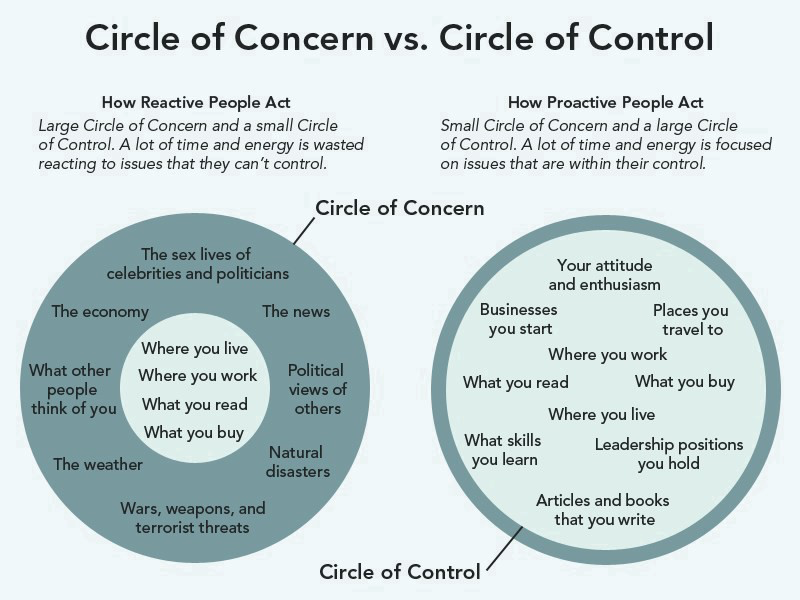Have you ever heard of the “circle of concern” and the “circle of control”? These two concepts, introduced by Stephen Covey in his book “The 7 Habits of Highly Effective People,” are simple yet powerful in helping you focus your time and energy on what truly matters in life.
I remember the first time reading about this concept from Stephen Covey’s book. There are many other areas covered in this wonderful book that each of us should read and reread “The 7 Habits of Highly Effective People” and apply it into our own lives.
Let’s start with the “circle of concern.” This refers to all the things that worry us or occupy our thoughts, but over which we have little or no control. For example, natural disasters, world peace, or the economy. These are important things that we may care deeply about, but they are outside of our control. Covey emphasizes that it’s essential to differentiate between the things we can change and the things we cannot, in order to effectively manage our time and energy.
On the other hand, there’s the “circle of control.” This is the smaller circle of things that we have the power to influence or change. For example, our thoughts, emotions, habits, and actions. Covey explains that by focusing on the things within our circle of control, we can actually make a difference in our lives and the lives of those around us.
So, what’s the point of these two circles? Well, the idea is that we should focus our time and energy on the things within our circle of control, rather than getting bogged down by the things outside of it. By doing so, we can increase our sense of personal control and effectiveness.
For example, instead of worrying about the state of the world, we can focus on being a positive influence in our own community. We can volunteer, help out a neighbor, or simply spread kindness wherever we go. These small actions can add up to create a big impact and increase our sense of personal satisfaction and fulfillment.
In my own case, I realized what I couldn’t control, especially when it came to what others did or didn’t do. Once I understood this, I stopped caring what others thought about the things I did or the way I looked (with the exception of dressing for certain events, though not all the time).
It’s important to remember that the circle of control is not static. As we grow and develop, we can expand our sphere of influence. By taking control of our thoughts, emotions, and actions, we can develop new skills, build new relationships, and create new opportunities. Covey explains that this expansion of the circle of control is at the heart of personal growth and development. As I’ve grown older and supposedly wiser, my own growth has multiplied. This article that I wrote is within my circle of control and so is anything I do that moves me forward.
I know that I am not the same brash youngster when I was in the Marines and the LAPD. I’ve surpassed those versions of me. So can you.
In contrast, constantly focusing on the things outside of our control can lead to frustration, stress, and a feeling of powerlessness. So, the next time you find yourself worrying about something outside of your control, try to shift your focus to what you can control. You’ll be amazed at the difference it makes.
To wrap it up, the “circle of concern” versus the “circle of control” is a simple yet powerful concept introduced by Stephen Covey in “The 7 Habits of Highly Effective People.” By focusing on the things within our control, we can make a positive difference in our lives and the world around us. So, start small, and expand your circle of control one day at a time.
